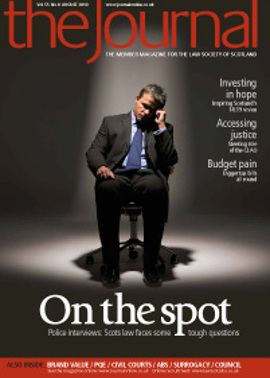Been there, done that

Solicitors are understandably anxious about the impact of legal services reform on their independence. The debate has naturally focused on the issue of profits versus ethics. Questions are being asked about client confidentiality, the solicitor’s duty to the court and ensuring a level playing field for providers. Yet a lengthy debate has allowed some consensus to form around a new business model that must be at least 51% owned and controlled by solicitors.
But the politicians preparing to legislate do not sit in Holyrood. And those voicing concerns are not Scottish solicitors. This is not Tesco law, it is Coles law, named after the Australian chain of supermarkets – and the debate is taking place in New South Wales, 20 years ago.
A pioneer of new business structures, New South Wales moved towards relaxing the prohibition on profit sharing as early as the 1970s, with the debate continuing into the 80s. In 1990, legislation was introduced that allowed the formation of solicitor corporations. However, restrictions placed on the corporations effectively ensured that they remained owned by solicitors or their families.
Further legislation allowed lawyers to form multidisciplinary partnerships (MDPs) with other professionals from 1994, though legal practitioners were required to retain at least 51% ownership and control of the practice.
Like the solicitor corporation model introduced previously, MDPs attracted little interest. Finally, following a federal government review of competition policy, it was decided that all restrictions should be removed, with legislation in 2001 and 2004 allowing lawyers to form whatever commercial structure they chose, including MDPs, incorporated legal practices (ILPs) and stock market listing.
Appropriate objectives
Given the pace and frequency of reform, effective regulation has played a vital role in maintaining professional standards. Steve Mark, still the state’s Legal Services Commissioner after being appointed the first office-holder in 1994, explains: “The legal reform process has never stopped since the Office of the Legal Services Commissioner (OLSC) was created to receive and investigate complaints about solicitors and barristers in New South Wales, resolve consumer disputes and oversee the regulatory system.
“Underpinning all that we do is the commitment to promoting ethical behaviour and protecting the integrity of the legal profession as it moves away from the traditional partnership model to new structures. Key to that is the requirement for all ILPs and MDPs to have a legal practitioner director who can maintain ‘appropriate management systems’ and allow services to be provided in accordance with professional obligations.
“Rather than impose a particular type of management system on all firms, the OLSC asked what they considered appropriate. Together with the legal community, we agreed that the management system should address 10 objectives, including competent work practices to avoid negligence, effective communication, timely identification and resolution of conflicts of interest, proper records management, and effective staff supervision. All the firms that incorporate develop their own management system so it is not a case of one size fits all. Firms self- assess compliance, though I also have strong powers of audit and can take disciplinary action against practitioners. If problems are identified during self-assessment, I talk to them and try to ensure they are compliant. It is compliance-based regulation rather than complaints-based regulation.”
Growth in popularity
To Steve Mark, who has followed the debate about reforming the legal services market in Scotland and elsewhere in the UK, many of the concerns expressed about the impact of new business structures and regulatory regimes are familiar. “It was assumed here that a legal practice would not be independent and able to maintain ethics if lawyers were in business with anyone else, because they would be sullied by non-lawyers who could force them to act unethically or compromise their duties to the court.
“But the process of incorporation, involving as it does a self-assessment system of regulation, actually promotes independence. Likewise, although there is a generally held belief that regulation suppresses professionalism, nothing could be further from the truth. In New South Wales, it’s the opposite – we regulate to promote professionalism.”
Mark explains that the requirement to appoint a legal practitioner director on incorporation ensures that he or she maintains a direct interest and accountability in the management of legal services. Similarly, an appropriate management system ensures the legal practice considers and implements measures that support and encourage ethical and client-focused behaviour. The combination of both measures helps to preserve the integrity of legal practice and legal ethics.
To date, the incorporation process has proved attractive to significant numbers of firms. A total of 934 firms have adopted ILP status – 19% of the state’s 4,742 practices – though only 31 have recognised advantages in the MDP model. The jurisdiction is larger than Scotland, with 21,000 Law Society solicitors serving a population of almost seven million, though not dissimilar in some ways. There are several large urban areas, but the profession remains heavily structured around the small firm. Incorporation has been most popular among practices with three or more partners, though sole practitioners and national firms have also opted for ILP status.
The smaller number of MDPs have mostly formed to provide financial services – for instance, involving lawyers along with a financial adviser, accountant and tax adviser – or property services, with a solicitor, estate agent and developer. Other MDP models have involved professionals getting together to reduce overheads, for example solicitors and doctors sharing premises. Supermarkets and big business have shown little interest in such structures, though the large law firms have explored potential tax benefits.
Two Australian firms – Slater & Gordon and International Legal Holdings – have gone even further and listed on the stock exchange. Again, though, safeguards were built into the listing process, with company documents and shareholder agreements explicitly stating that the primary duty of the firms was to the court, second to the client and third to shareholders. It was also agreed that, in the event of a clash between legal profession regulation and the Corporations Act, the former would prevail.
Ethical focus
Mark comments: “All these changes have not, contrary to popular belief, destroyed the legal services marketplace in New South Wales. We have not seen a disturbing change in the practice of law. Nor have we seen a rise in the number of complaints concerning incorporated legal practices. In fact, we have seen a significant decrease in the number of complaints for incorporated legal practices.”
It is his belief that one of the main reasons why they have not experienced the predicted doom and gloom is because of the way they have decided to regulate incorporated legal practices, focusing on entrenching and promoting ethical behaviour and encouraging the profession to remain a true profession as well as operating like a business.
“We must remain vigilant but, by working with and educating the profession, the challenges have proved manageable”, he continues. “All of a sudden, after the financial crisis, everyone is looking at ways of moving away purely from shareholder value while providing better protection for consumers. We have got it – the legal community in New South Wales is leading the charge.
“Whatever system is adopted in Scotland, the experience here has shown that regulating for professionalism and ethical behaviour has allowed solicitors to respond to the shifting pressures and challenges of the marketplace while maintaining their well-deserved reputation for the highest of standards.”
- Craig Watson is a freelance writer with a special interest in legal affairs
In this issue
- From Cadder to Calman via Constitution
- We can make the bill work
- The Cadder effect
- Bio Quarter: a case study
- Budgets of many colours
- Been there, done that
- Gill and the consumer
- Smoothing the path
- Net yourself a baby
- What's in a name?
- Inspiring change
- Further work in hand on constitution
- Faculty support on the agenda
- PCC's first year of "unsatisfactory" complaints
- From the Brussels office
- Learning in context
- Paper, pixel and process
- Growing cloud
- Ask Ash
- PQE: Post Qualification Equality?
- Technology to the rescue?
- "Definitive" approach
- Threat, or opportunity?
- Equality for all?
- Time to take a stand?
- A burden discharged
- The promise of certainty?
- A future for crofting
- Final tally
- Website review
- Book reviews
- An easy way to give?
- Three cheers for iPad






